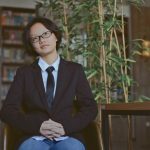Recently, the Humanities Research Center organized a series of conversations on the theme of interdisciplinarity and innovation. James Miller, co-director of the Humanities Research Center and Associate Dean of Interdisciplinary Strategy joined with students from the HumanSpace+ research group in conversation with four distinguished practitioners of interdisciplinary research.
- Simon Goldhill, Cambridge University, on the future of knowledge.
- Evan Thompson, University of British Columbia, on the future of the mind
- Thomas Bruhn, Potsdam University, on the future of the planet
- Ed Turner, Princeton University, on the future of life
Following the conversations, the students in the HumanSpace+ group penned their thoughts about the conversations.
Leiyuan Tian on the Future of the Mind

On April 23rd, we had our second Zoom conversation of the series with Professor Evan Thompson from the University of British Columbia, a philsopher who works on the human mind and consciousness with an interdisciplinary approach. Prof. Thompson began the talk by explaining how the study of the mind is “inherently interdisciplinary” and then focused on the question of the relationship of science to other disciplines, and whether science was in some way exceptional. This part of the conversation was particularly inspiring for me, especially as regards the changes that are necessary in people’s attitudes towards different knowledge systems in order to nurture interdisciplinary interactions.
When discussing the notion of disciplinary exceptionalism, for example, Prof. Thompson mentioned the social mindset that places science above other approaches to a question in a hierarchy of disciplines. This, he argued, confuses the concept of the uniqueness of science with the notion of science being exceptional. This resonated with me the most, since I grew up in a social context that puts extreme emphasis on science over other subjects historically, ideologically, and realistically. It is interesting how Prof. Thompson argued against this overemphasis on science by demonstrating that science is also dependent on human experience, and people tend to forget the fact that science also belongs to the larger cultural framework of human society. I was excited at his proposal of a radical approach to align the interdisciplinary framework with the cosmopolitan worldview: to eliminate the disciplinary framework and think more fundamentally about the questions we encounter as well as the possible methods to investigate these questions. This idea of promoting the questions instead of the disciplines “in the institutional sense”, in my opinion, reveals the true essence of interdisciplinarity. Interdisciplinarity is not the opposite of specialization; rather, it is an attitude that appreciates question-driven approach to academic research and advocates compassion for other human minds.
Eldar Wang on the Future of the Planet

Thursday 30 April, the third conversation in the Interdisciplinarity and the Future of the Planet series took place in the usual cyber hall—Professor Miller’s zoom meeting room. The conversation was with Dr Thomas Bruhn from the Institute for Advanced Sustainability Studies at Potsdam University. The discussion mainly focused on the following questions: firstly, how can scientists, politicians and individuals understand each other and work together to solve the problem when faced with grand issues like climate change? Secondly, what could be done to bring people with professional backgrounds, such as scientists and engineers, into contact with politicians and the public? Thirdly, how can interdisciplinarity help when facing a tremendous task like COVID-19? Based on his background as a physicist and his experience leading interdisciplinary conferences on climate engineering, Dr Bruhn provided fascinating solutions to the audience.
During the conversation, I asked Doctor Bruhn: when it comes to tackling covid-19, politicians from different countries are working closely with scientists and relying on their opinions to support their decisions—which is very close to the interdisciplinary collaboration that we pursue. So, how can we facilitate such collaboration in other less urgent issues, such as climate change or wildlife protection? Doctor Bruhn’s response was very inspiring to me. In solving social crisis, interdisciplinary practice covers multiple fields of knowledge and different ways of comprehension, which promotes its advantages in innovation and problem solving. Some social problems or challenges faced by human beings can only achieve research success when the knowledge and research methods of several disciplines are integrated. Interdisciplinarity is not a one-size-fits all solution pack, but rather a way of trying, which requires time and patience.
Yetta He on the Future of Life

The conversation with Dr. Turner started with the history of the development of astrobiology as an interdisciplinary field in the natural sciences. As Dr. Turner’s metaphor vividly put it, the field joins people who share the same “background culture” in the sciences but have different “foreground contexts” in either cosmology or biology. In addition to being an interdisciplinary field within the sciences, astrobiological research has shed light more broadly in the humanities as well, a fact that was exemplified in the fabulous Q&A session that involved experts from very diverse fields including physics, philosophy, and history.
My major takeaway from this talk is that an interdisciplinary field should go beyond simply combining or integrating various disciplines, and by examining their limits can help bring forth new illuminations. Dr. Turner pointed out that rather than simply mixing cosmology and biology, astrobiology questioned their boundaries and had an influence even beyond sciences. He illustrated this with a common critique of astrobiology, that it only studies “lawkni”—life as we know it. If we go down the line of thought of this critique, taking a step back and examining our current definition of life, we end up challenging many other fields, as we rethink the commonly-presumed uniqueness of not only ourselves but also life in earth in general. Though no expert in astrobiology, I was delighted by the intellectual openness extended by thought-provoking questions that have continued to recur my mind to this day.